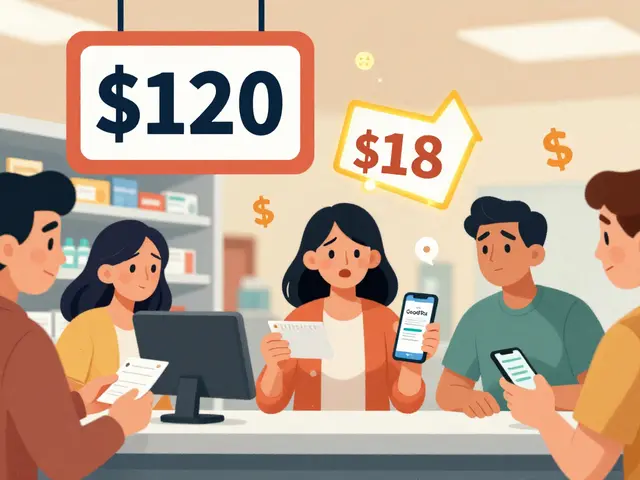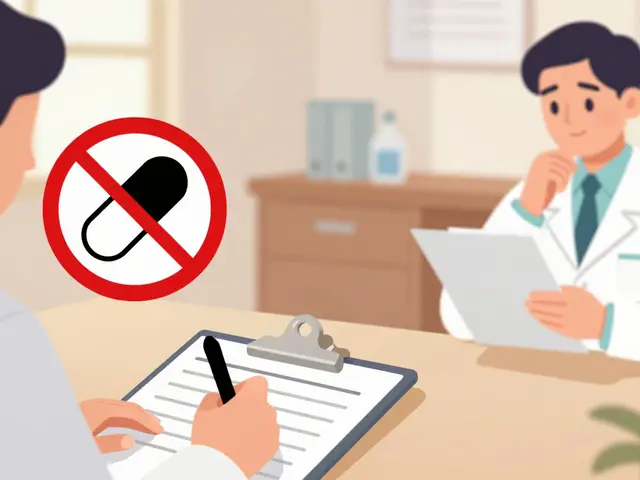
If you or someone you love has advanced prostate cancer, odds are the term "flutamide" has popped up in conversation with a doctor. This isn’t some miracle cure you hear about on late-night TV. Instead, flutamide is a solid, time-tested weapon when managing stubborn prostate cancer that’s moving beyond where it started.
So why do doctors trust flutamide when other options stall? The answer is simple. Prostate cancer often feeds on male hormones like testosterone. Flutamide steps in like a bouncer at the door, blocking those hormones from reaching cancer cells. It doesn’t shrink tumors overnight, but for a lot of guys, it buys precious time and eases symptoms.
Thinking about side effects? Good call. Like most medicines with a punch, flutamide comes with its own trade-offs. It's not unusual to deal with upset stomach, tiredness, or a bit of yellowing in the skin or eyes, which can signal liver trouble. That’s why doctors keep a close eye on blood tests while you’re on the drug.
Here’s a practical tip: setting reminders for meds and regular blood checks can save you a world of headaches. And don’t suffer in silence—there are ways to handle almost every side effect, so raise your hand early if something feels off. The next sections will break down exactly how flutamide works, what to watch for, and small changes that can make life a lot easier while on this med.
- How Flutamide Works in the Body
- When and Why Doctors Prescribe Flutamide
- Dealing with Side Effects
- Tips for Patients Using Flutamide
How Flutamide Works in the Body
So, what's going on when you take flutamide? Picture this: prostate cancer really gets a boost from male hormones like testosterone and something called dihydrotestosterone (DHT). These hormones act like fuel for cancer cells, making them grow and spread. Flutamide jumps in and blocks that process right at the source.
Technically speaking, flutamide is an "anti-androgen". It sits on the same spots on cancer cells that these hormones would latch onto. Think of it like putting tape over a keyhole—if the hormone (the key) can't fit, it can't open up the cell to send its growth signals. Without these signals, the cancer cells lose some of their power.
This drug is usually taken by mouth, and doctors often pair it with another treatment like luteinizing hormone-releasing hormone (LHRH) agonists, which reduce the amount of testosterone your body makes. The combo can be more effective than either alone. Most patients take flutamide three times a day—regular timing helps keep the hormone-blocking steady.
| Action | Result |
|---|---|
| Blocks androgen receptors | Prevents hormones from "feeding" cancer cells |
| Reduces tumor growth signals | Slows down cancer spread |
| Used with other hormone therapies | Boosts overall treatment effect |
Here’s something a lot of people don’t realize: flutamide doesn’t lower the level of testosterone in your blood. It just keeps the hormone from telling cancer cells what to do. That’s different from other prostate cancer meds, which try to stop your body from making testosterone at all.
If you’re thinking about treatment, remember that every person’s response to flutamide can be a little different. Some feel better pretty quick because their symptoms settle down as hormone activity drops. That’s usually a green flag that the drug is doing its job—blocking those "grow" signals from reaching the cancer cells.
When and Why Doctors Prescribe Flutamide
Doctors usually turn to flutamide when prostate cancer has spread beyond the gland itself or when a first set of hormone treatments isn’t doing the job anymore. In medical circles, this is called advanced or metastatic prostate cancer. The aim is simple—keep those cancer cells from soaking up testosterone, which would give them a green light to grow.
But here’s the thing: flutamide almost never gets used by itself. It’s almost always paired with other treatments, like LHRH agonists or surgery that removes or shuts down the testicles. This dual punch—blocking hormone production at the source and blocking what’s left at the cancer cell—has a name: combined androgen blockade (CAB).
- Flutamide isn’t the first choice for early-stage prostate cancer. It’s reserved for cases where the cancer is more aggressive or has come back.
- Doctors sometimes use flutamide as a backup when other anti-androgens (like bicalutamide) don’t work or aren’t tolerated.
- It may be used after chemical or surgical castration to catch the small amount of male hormones left in the body.
- There are cases where doctors prescribe flutamide to reduce the "flare" reaction that can happen when starting LHRH agonist shots (meaning the cancer might get worse for a brief time before getting better).
To give you an idea of how common this practice is, check out the stats in this table from a recent cancer registry:
| Situation | Percent Using Flutamide |
|---|---|
| Advanced/metastatic diagnosis | 41% |
| After LHRH agonist resistance | 22% |
| Early-stage prostate cancer | <5% |
For many guys, the biggest reason their doctor prescribes flutamide is because it’s been around the block—it has a track record, and its side effects and strengths are well-known. Still, your care team will always weigh the risks and possible benefits, considering things like other health conditions, liver function, and what treatments you’ve already been through.

Dealing with Side Effects
If you’re thinking about starting flutamide for advanced prostate cancer, be ready for the good, the bad, and the sometimes annoying. The drug blocks hormones that feed prostate cancer, but it doesn’t just target cancer cells. Other parts of your body feel it too.
The biggest side effect people talk about is liver trouble. About 1 out of every 20 men on flutamide will see their liver enzymes creep up on blood tests. Most cases are mild, but serious liver issues can happen if nobody’s paying attention. That’s why bloodwork before and during treatment isn’t just a suggestion—it’s mandatory.
| Side Effect | How Common? | What You Can Do |
|---|---|---|
| Upset stomach/diarrhea | Up to 30% | Take meds with food, stay hydrated |
| Fatigue | About 15-20% | Take breaks, pace yourself |
| Liver problems | 5-7% | Frequent blood tests, report yellow skin or eyes |
| Breast tenderness/swelling | Less than 10% | Wear comfortable clothing, mention to your doc |
Here’s the practical stuff:
- Stick to your blood test schedule—no skipping appointments because you feel "fine."
- Take flutamide with food to keep your stomach settled.
- Always call your doctor if you see yellowing of your skin or eyes. It could mean your liver needs a break.
- If diarrhea becomes a thing, plain foods and extra fluids help. If it doesn’t get better, let your care team know.
- Avoid over-the-counter painkillers like Tylenol unless your doctor says it’s okay. Some of these hit the liver too.
"Liver toxicity is the most important adverse reaction seen with flutamide. Regular monitoring is critical," says the American Cancer Society.
If side effects are getting in the way of daily life, there’s a good chance your team can adjust the dose or look for other options. Bottom line: there’s rarely a need to tough it out. Quick action often means small problems stay small.
Tips for Patients Using Flutamide
Starting flutamide? There’s a learning curve, but nobody needs to go it alone. Here’s what makes the road smoother when you’re on this prostate cancer treatment.
- Stick to a schedule: Flutamide usually needs to be taken three times a day, about eight hours apart. Set alarms on your phone or use a pill organizer. Skipping doses can mess with your hormone levels, and that’s not great for your treatment.
- Watch your liver: Flutamide can mess with your liver, especially in the first couple months. Doctors often check your blood for liver issues every month at first. If your skin or eyes start yellowing, or if dark urine shows up, call your doctor right away.
- Stay hydrated: Some guys on flutamide deal with stomach problems, like diarrhea. Drinking plenty of fluids helps fend off dehydration. Keep snacks handy that are easy on your gut—think crackers or bananas.
- Keen on side effects: Besides the liver stuff, flutamide might make you a bit more tired or give you hot flashes. Don’t ignore changes, even weird ones like breast tenderness or swelling—report them sooner rather than later.
- Share all your meds: Tell your doctor about every drug or supplement you take, including over-the-counter and herbal stuff. Some meds mix badly with flutamide and can up your risk for side effects.
- Don’t suffer in silence: If something feels off, don’t tough it out. Doctors have tricks to help, whether it’s changing dose times or adding a new med for relief.
For guys who like numbers, check this out. Flutamide’s side effects don’t hit everyone the same way. Here’s a quick look at what patients most often experience:
| Side Effect | Rough % of Patients |
|---|---|
| Breast tenderness/swelling | About 30% |
| Diarrhea | Approx. 25% |
| Liver issues | Under 10% |
| Fatigue | Up to 20% |
| Hot flashes | 15% |
Little routines matter. Take flutamide with food if your stomach gets upset. Keep routine check-ups on the calendar, and don’t shy away from writing down questions before each visit. Your care team’s used to all sorts of questions—they honestly prefer it when you ask.






20 Comments
Oh great, another anti‑androgen-just what the world needed, right? But seriously, if flutamide helps you dodge the testosterone‑fuel, you’ve earned a solid high‑five.
Flutamide’s mechanism is essentially a competitive antagonist at the androgen receptor, which means it occupies the binding site without activating downstream signaling. By doing so, it prevents dihydrotestosterone from driving tumor proliferation. Clinically, this translates to a modest delay in disease progression, especially when combined with LHRH agonists in a combined androgen blockade regimen. Patients should be monitored for hepatic enzymes every 4–6 weeks, as elevations can precede clinically significant liver injury. If transaminases rise beyond three times the upper limit of normal, dose reduction or discontinuation is warranted. Additionally, taking the tablets with meals can mitigate gastrointestinal upset, which is reported in up to 30% of cases. Maintaining a consistent dosing schedule-typically three times daily-ensures steady plasma levels and maximizes receptor occupancy. Overall, flutamide remains a cost‑effective option in settings where newer anti‑androgens are unavailable or contraindicated.
look man flutamide is just another pill you swallow while the cancer still hangs around its own terms dont expect miracles
I totally think flutamide can be a lifesaver-if you stick to the med schedule and watch out for any yellow ting things in your skin. Its not the flashiest drug but it does the job and many guys feel better when they finally get the hormone block right. Just remember to drink lots of water and keep those doctor appointments, okay?
Take it three times a day, no excuses.
Ensuring you take flutamide with food can significantly reduce gastrointestinal discomfort. It is also advisable to keep a medication diary, noting the time of each dose and any side effects you experience. This record will be invaluable for your healthcare provider when adjusting treatment.
Even if you follow every tip, the fatigue will still hit hard and you’ll feel drained all day.
From a philosophical standpoint, the use of flutamide raises interesting questions about how we intervene in our own biology. While the drug blocks a natural hormone, it does so to extend quality of life, illustrating the nuanced trade‑offs inherent in modern medicine.
people need to stop ignoring liver tests its not optional its basic care.
Most patients don’t realize that flutamide’s efficacy is limited to androgen‑dependent tumors; if the cancer has already progressed to a castration‑resistant state, the drug offers little benefit.
Indeed, the clinical application of flutamide within the paradigm of combined androgen blockade has been a subject of rigorous investigation for decades. While the drug’s pharmacodynamic profile as a non‑steroidal anti‑androgen is well‑characterized, its role in contemporary therapeutic algorithms warrants careful scrutiny. First, the molecule exerts its effect by competitively inhibiting the androgen receptor, thereby preventing dihydrotestosterone‑mediated transcriptional activation. Second, this blockade translates into a measurable, albeit modest, reduction in prostate‑specific antigen kinetics in a subset of patients. Third, the adverse event spectrum-particularly hepatotoxicity, gastrointestinal upset, and gynecomastia-necessitates vigilant hepatic monitoring at baseline and throughout therapy. Fourth, guidelines recommend monthly liver function assessment during the initial treatment phase, with more frequent testing if abnormalities emerge. Fifth, when flutamide is administered concomitantly with luteinizing hormone‑releasing hormone agonists, the synergistic suppression of androgenic signaling can prolong time to progression. Sixth, cost considerations remain salient, as flutamide is considerably less expensive than newer agents such as enzalutamide or apalutamide. Seventh, in resource‑limited settings, this economic advantage may tip the balance in favor of flutamide despite its side‑effect profile. Eighth, patient adherence is paramount; the thrice‑daily dosing schedule can pose practical challenges, underscoring the importance of tailored medication calendars. Ninth, clinicians should counsel patients on recognizing early signs of hepatic dysfunction, including jaundice, pruritus, or dark urine. Tenth, should liver enzyme elevations exceed three times the upper limit of normal, a dose reduction or transition to an alternative therapy is prudent. Eleventh, emerging data suggest that genetic polymorphisms in drug‑metabolizing enzymes may influence individual susceptibility to toxicity, a factor that could inform personalized treatment decisions. Twelfth, while flutamide has largely been superseded by next‑generation anti‑androgens in many oncology centers, it remains a viable option in specific clinical contexts. Thirteenth, ongoing trials continue to evaluate its utility in combination with novel hormonal agents. Fourteenth, the ethical imperative to provide patients with comprehensive information about benefits, risks, and alternatives cannot be overstated. Finally, a shared decision‑making approach, integrating patient values and clinical evidence, ensures that the selection of flutamide aligns with both therapeutic goals and quality‑of‑life considerations.
if you think blocking receptors is magic then you miss the biology it’s just chemistry working on a lock the hormone is the key and flutamide is the broken key that won’t turn
Honestly, flutamide is just a cheap fallback when doctors run out of fancy drugs.
Remember, taking your meds on time and talking to your doctor about any changes helps keep you on track and feeling better.
i guess you could try flutamide but maybe there’s something else better you haven’t heard of
Don't be fooled – the pharma industry pushes flutamide as a “solution” while hiding data on long‑term liver damage; independent studies suggest safer alternatives exist.
Push through the side effects, stay on schedule, and you’ll see the benefits-don’t let a little fatigue stop you from fighting!
Oh, because nothing says “cutting‑edge care” like a drug from the 80s, right?
just keep your liver tests regular and call the doc if anything looks off.
Great job staying on top of your treatment!
Keep those appointments, keep the meds, and keep the positive attitude-every small step counts toward better health!